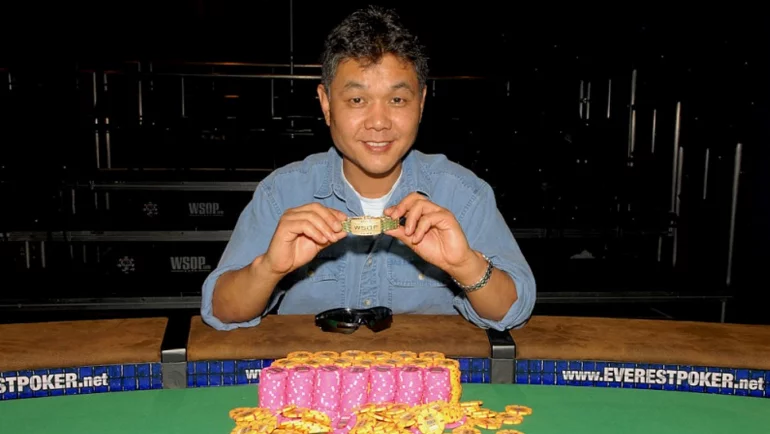Any poker fan will name a few famous players who have been awarded all sorts of titles and awards. Their faces constantly flash on the screen, and their names do not leave the headlines of specialized publications. They participate in major tournaments, often appear on popular TV shows, and generally lead the lifestyle of fundamental stars.

But not all gurus aspire to fame and recognition. Many prefer to stay in the shadows, playing for huge bets behind closed doors at VIP halls. They avoid journalists, don't give interviews, and consider playing poker their job.
Such a professional player will be discussed in the article.
Sushi Chef Making Millions in Poker
Ian Chen lives in a luxury house worth several million dollars in Orange County, California. It's an incredible achievement for a man of his background. Ian was born into an impoverished family in a small Chinese town. His father had to work as a janitor. Unlike most of his peers, the boy did not wear clothes for his brothers but his sisters.
Chen successfully graduated from high school, studied sushi chef, lived in the United States, and received a degree in political science. For a time, he even attended the prestigious Columbia Law School.
Ian is currently not working in his specialty. He preferred another occupation, which gave him absolute pleasure and brought a solid income. Chen plays poker professionally.
Yan Chen: To become a good professional player, you must use everything you were taught in school: mathematics, psychology, human behavior, self-control, and even compassion, as strange as it sounds. Because you have to understand how your opponent thinks.
He spends two-thirds of his time online, sitting in front of a computer in his home office. He often plays at two or three tables simultaneously, not specifically choosing opponents.
Jong does not play in tournaments, attend significant poker events, or participate in specialized activities.
Yan Chen: I'm not playing for recognition. I don't play for respect. I'm not playing to be a poker star. Playing for money is better suited to my lifestyle. I don't need to travel. So I play for money. Only on money. Period. I play for money to support my children.
Yen prioritizes a real-money game offline. He regularly plays poker at Commerce Casino in southern California. Chen is a regular at the local VIP lounge, where the standard buy-in is fifteen thousand dollars, but many visitors immediately buy chips for much more significant amounts.
Still, we note that Ian periodically participates in tournaments very successfully. He has won several major tournaments and is well-known in the professional poker industry.
Pros and Pons of Being a Poker Player
The life of a player – is by no means eternal celebration. In addition, luck is not always favorable to them, and competitors do not sleep. Even the best poker masters are not always in the black.
Yan Chen: I lost a quarter of a million dollars last week. Last week I was losing pretty big every day. But I have to put up with it. I play high-stakes poker. The potential rewards and potential losses are enormous. Yesterday was a typical day. First I lost $65,000 and then I won $133,000.
Carol, Chen's wife, was used to it:
There's no getting away from it. Sometimes he says he lost. You have to deal with big losses like last night. Sometimes I feel ... not to say it is depression, but I want him to return the money. He's constantly under pressure, so I have to be patient. I think I love him very much. I told him that if he became very poor one day, I would stay with him.
What about Gambling?
Chen can play poker day and night. His personal best is ninety hours at the table. Colleagues even nicknamed him Marathon Man. But Ian doesn't consider himself a gambler and denies even a hint of gambling addiction.
Yan Chen: I can quit at any time. Sure, I love poker, but I'm not addicted. I can leave poker whenever I want.
However, Chen admits that playing poker impacts a person's psyche and changes it forever.
You play the game, but the ultimate goal, in reality, is to win money. When you win, someone else loses. If you do it day after day, in fact, you stop empathizing with people. When I reached a certain level of financial stability, I began to look back at the past and realized that money is not everything. Of course, I'm working on it.
Playing poker at the highest level is impossible without learning to bluff and mislead opponents. Ian knows this art perfectly but claims he hates lies and tries to be as honest as possible.
In addition, Chen admits that he does not like gambling in general. He never plays unless the math is on his side. An extremely prudent approach to poker allows him to succeed in the long run.
Watch the video of the interview with Chen on YouTube.
Conclusion
Articles on Casinoz are read by people for whom the poker game has also become a source of income. If you are one of them, share your opinion in the comments. Do you agree with what Yen Chen says about professional poker?
We also invite all poker fans to discuss. Write reviews, share your experiences and ask questions.














